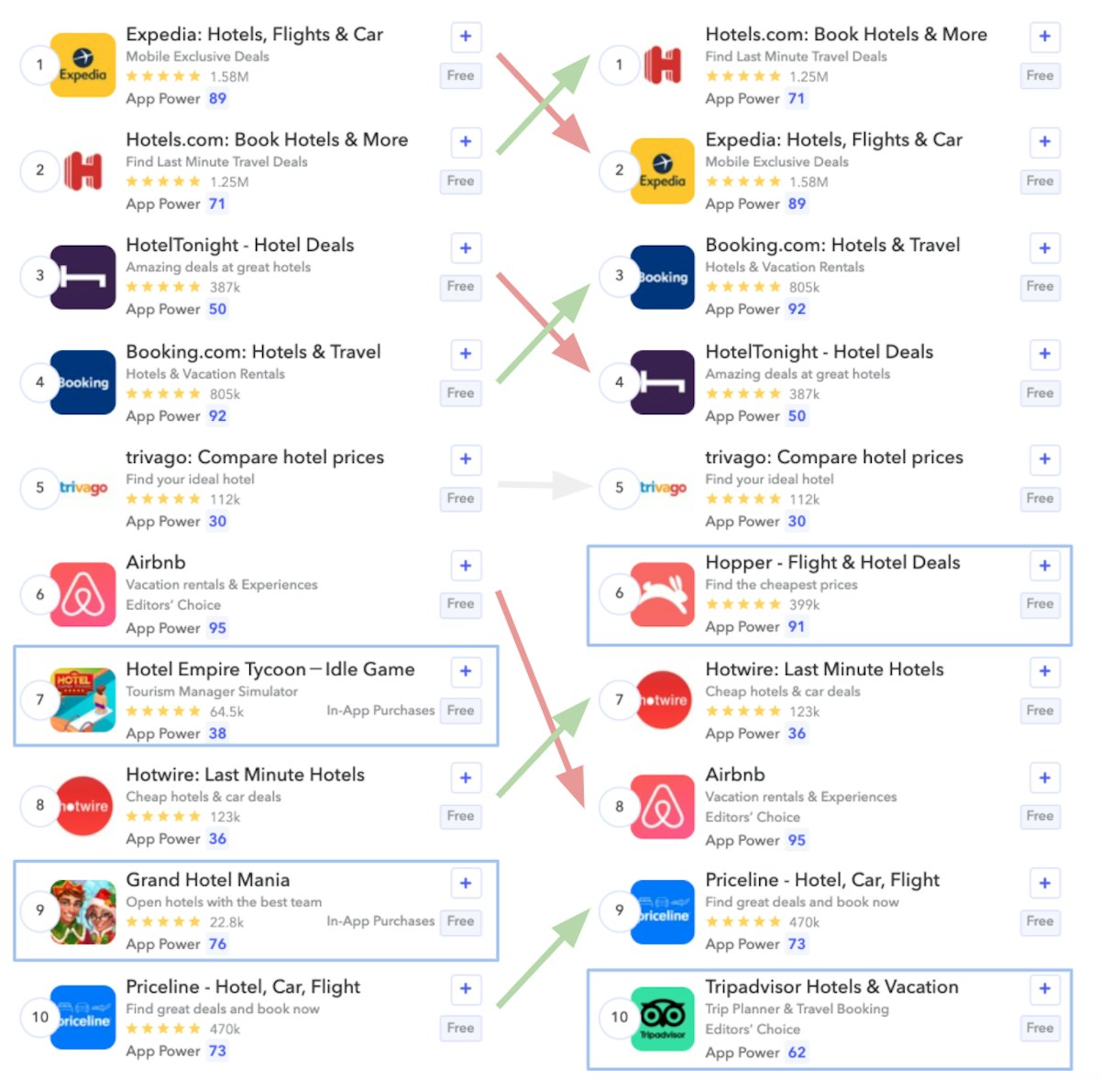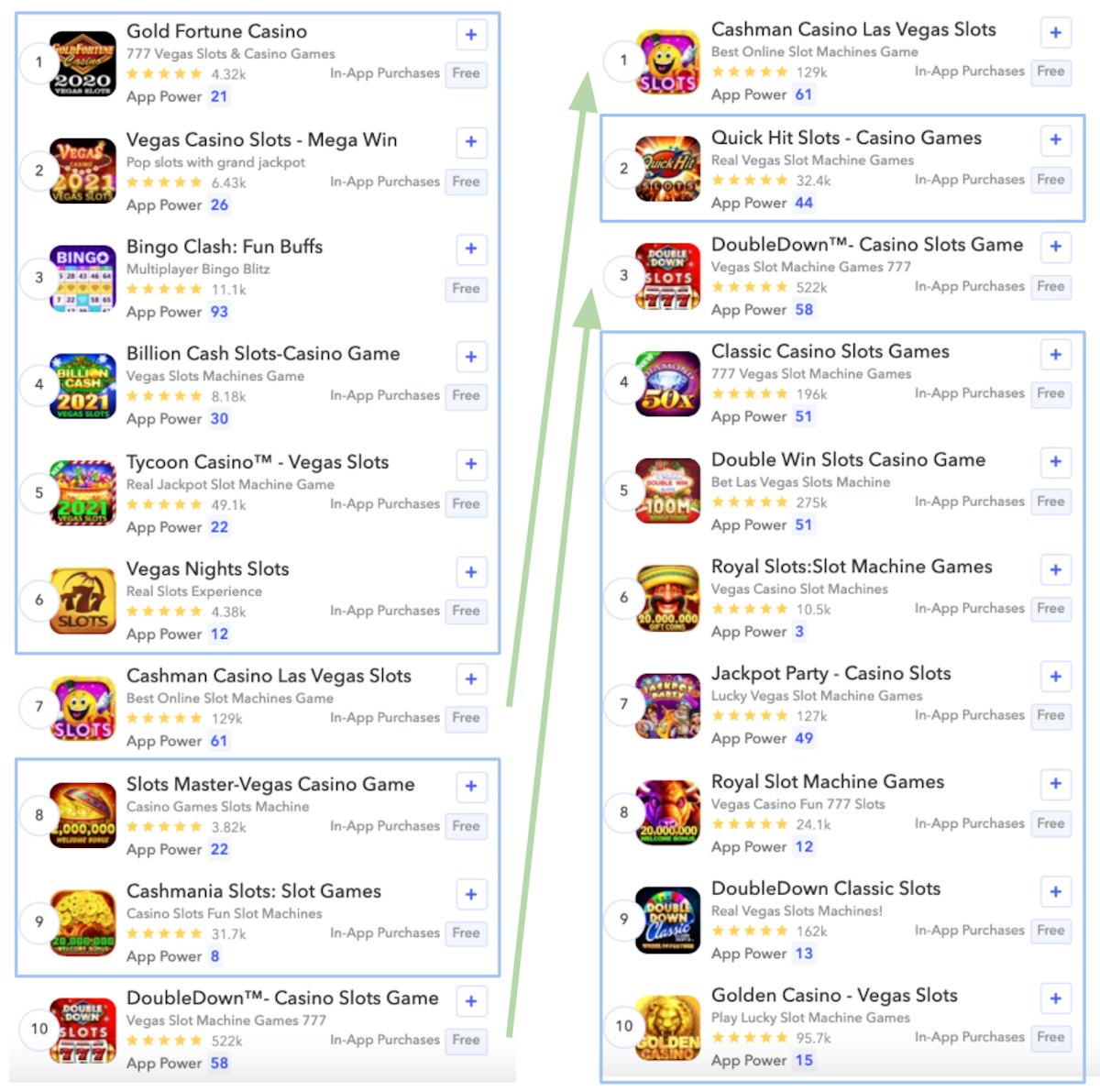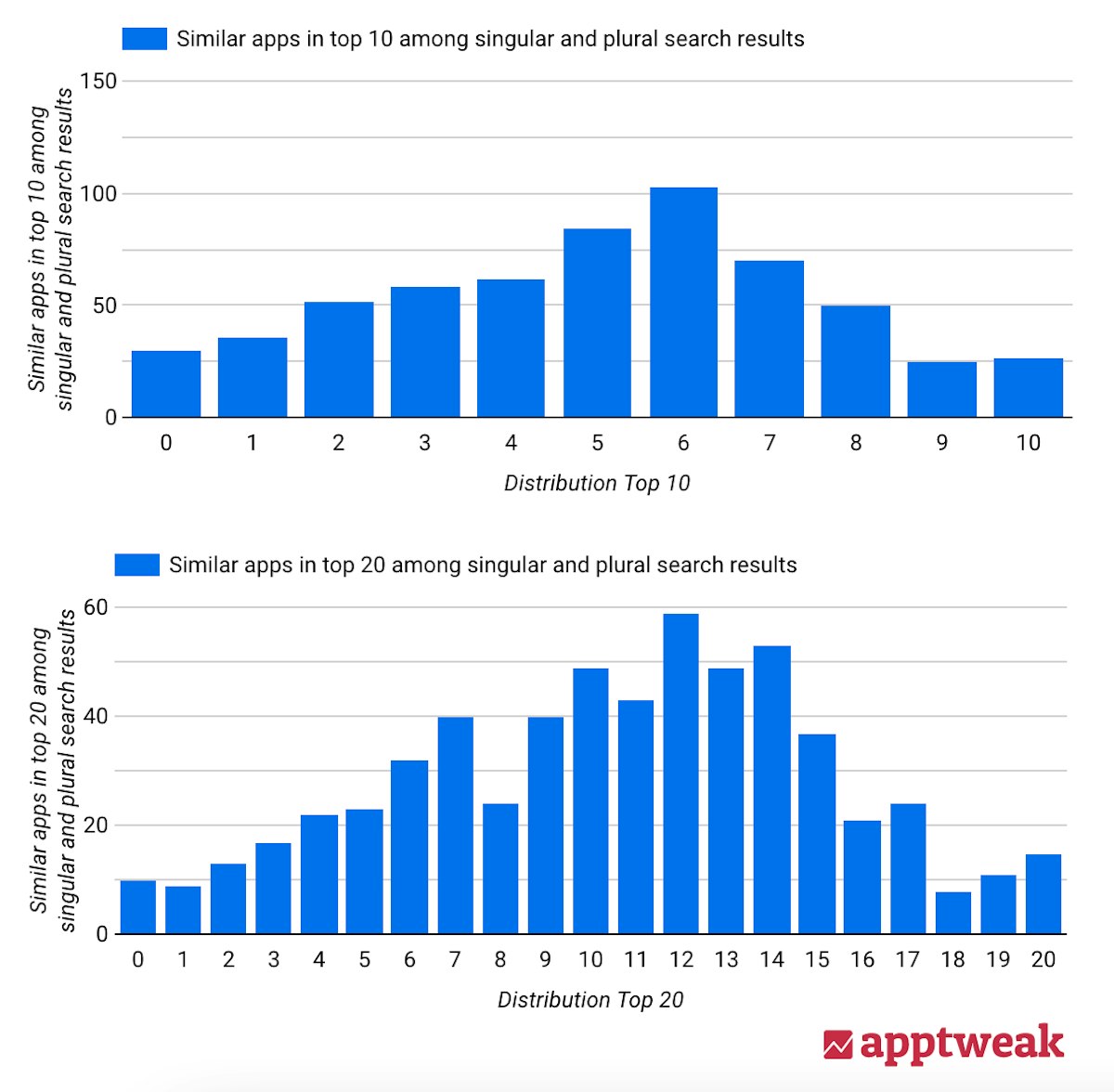
Do Singular or Plural Keywords Rank Differently in ASO?
It is widely considered that there is no need to target both plural and singular forms of a keyword because the app should be indexed for both and rank similarly on both versions. But how similarly do they actually rank and how do you decide which form to use?
To find out, we’ve analyzed the 20 top search results for 600 keywords in total. We compared app rankings for singular and plural terms for iOS and Android apps in 3 countries (US, France, Spain).
How do rankings compare for plural vs singular keywords?
When searching for the keywords “hotel” and “hotels” on the App Store, we can see that apps are ranking very similarly on the singular (left) and plural (right) version of the same keyword.
In fact, 8 apps out of 10 appear in the top 10 for both keywords. However, 2 games found in the top results for “hotel” with the singular form in their title are not found in the top 10 for “hotels.” Inversely, Tripadvisor that ranks #10 on “hotels” with the plural form in its title does not rank in the top 10 for the keyword “hotel.”
Also, Hopper ranks higher on “hotels” (#5) than “hotel” (#12), which is intriguing because the app targets the singular and not the plural form in the title.
 Live Search results for the keywords “hotel” (left) and “hotels” (right) in the App Store, US.
Live Search results for the keywords “hotel” (left) and “hotels” (right) in the App Store, US.
We’ve seen other examples where the top 10 search results differ widely for the singular and plural forms. For example, the apps ranking top 10 for “casino” are completely different from the ones ranking for “casinos.” In fact, only 2 games out of 10 rank top 10 for both terms.
 Live Search results for the keywords “casino” (left) and “casinos” (right) in the App Store, US.
Live Search results for the keywords “casino” (left) and “casinos” (right) in the App Store, US.
To get a better understanding of these ranking behaviors, we have to dig a little deeper. Does the volume of a keyword play a role? Is there a correlation with exact matches in titles or subtitles/short descriptions? Are there trends we can spot when many keywords are considered? To answer those questions, we conducted a study on a larger number of keywords. We have compared the top search results of 100 singular keywords and their plural equivalent in 3 countries (US, France, Spain) for both the App Store and Google Play.
1. Half of top 10 apps rank for both singular & plural keywords
Our study showed that on average, half of the apps that rank top 10 for a singular keyword will rank top 10 for its plural form. The bar charts below take into account data for both the app stores in the US, France, and Spain.
The results really vary from a keyword to another: in some cases, top search results are almost the same (8 to 10 similar apps), while in other cases they are completely different (0 to 2 similar apps).
In the chart below, the Y-axis represents the pairs of singular-plural keywords and the X-axis shows the number of similar apps for those pairs.
 For more than 100 keywords, we found that 6 apps appeared in the top 10 search results of both the singular and plural keywords.
For more than 100 keywords, we found that 6 apps appeared in the top 10 search results of both the singular and plural keywords.
A detailed segmentation shows that there are no significant differences across countries, but there is a bigger difference between the App Store and the Google Play.
On average, 5.6 apps out of 10 rank in top 10 both for singular and plural keywords on Google Play, but only 4.4 apps out of 10 do so on iOS. This means that there is a greater disparity among results on iOS than on Android between singular and plural search results. The Google algorithm will show more similar results on average. Still, the number of similarities between search results for singular and plural keywords in the top 10 charts is still quite low for Google Play as well.
| Store | United States | France | Spain | Average per store |
|---|---|---|---|---|
| iOS | 4.72 | 4.37 | 4.1 | 4.4 |
| Android | 5.3 | 5.79 | 5.69 | 5.59 |
Number of apps ranking in the top 10 for both a singular and a plural keyword.
2. Top 10 search results are more similar with higher volume
For keywords with a higher volume, the number of apps ranking top 10 in both the singular and plural search results is generally higher.
Apps are also more often adding the exact keyword (singular or plural) to their metadata when the given keyword is more popular. Since more people are searching for those high volume app store keywords, publishers are more likely to include an exact match.
Furthermore, one might think that there is more or less difference in search results depending on the difference in volume between the singular and plural keyword. However, it appears that it’s not the case.
For example, in France (Android), there are 6 similar apps in the top 10 for “maison” (house, volume 60) and “maisons” (volume 7), but there are also 6 similar apps for other keywords with a similar volume between their singular and plural form.
3. Few top 20 apps on the App Store target exact match in metadata
By exact match, we mean that a minority of apps that ranks in the top 20 for a singular keyword actually included that singular keyword in their metadata (title or subtitle). The same goes for plural keywords – only a few apps in the top 20 ranking for a plural keyword included that exact keyword in their title or subtitle.
Therefore, adding a specific form (singular or plural) of a keyword into your title or subtitle does not necessarily increase your ranking chances for that exact keyword.
- If we search for “background” on iOS, the first search result is “Live Wallpapers for Me” (subtitle: “Cool Moving 4K Backgrounds”). This app doesn’t have an “exact match” as it does not target the singular form of “background” in its metadata, but it has a simple match, as it targets “backgrounds” in its subtitle.
- Then, the second search result for “background” is “Wallpapers True 4K & Full HD” (subtitle: “Only suitable wallpapers”). This app has neither “background” nor “backgrounds” in its title and subtitle, but it still ranks #2 on the singular form of the keyword probably due to a high keyword conversion and “background” being in the keyword field.
On Google Play, around half of the apps ranking top 20 in our subset had an exact match in their metadata (title or short description). As more characters are available on Android, developers are targeting an exact match a bit more often than on iOS, but many apps will still rank high without having the specific match in their metadata.
Deciding to target singular or plural keywords in metadata
Now that we’ve seen that plural and singular versions can rank differently, how do you decide which form to include in your metadata?
- It is best to consider and research both versions of the keyword as if they were completely different from one another, keeping in mind the perspective of localization and the intent of the user.
Expert Tip
By using an ASO tool like AppTweak, you can easily analyze the live search view and search volume to see which version of the keyword is the least competitive and for which you have the highest chance to rank high on.Learn more about how to track your competitors’ top-ranking keywords
- Depending on the keyword or language, you may find that it is preferable to target both the singular and plural versions of the keyword, especially when rankings are very different.
- Also, make sure to always monitor the results and make the necessary changes.



 Micah Motta
Micah Motta

 Justin Duckers
Justin Duckers

 Lina Danilchik
Lina Danilchik